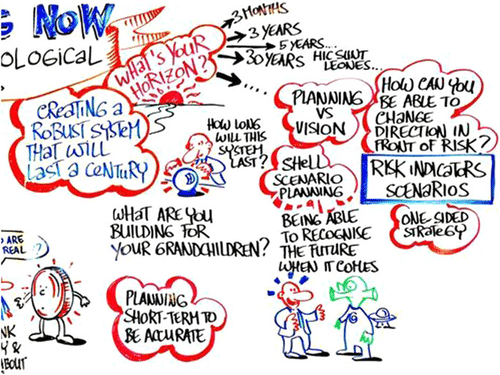
 I recently co-authored an article on banks for a better
I recently co-authored an article on banks for a better
planet with Doctor Carolyn Stephens of the Institute of Health Equity at
University College, London (UCL).
The article was published in the January issue of the
Journal of Environmental Development, and here’s the basic version:
Banks for a better
planet? The challenge of sustainable social and environmental development and
the emerging response of the banking sector
by Carolyn Stephens
and Chris Skinner
In mid 2012, the world’s political leaders, and a multitude
of scientific, UN, governmental and non-governmental agencies, met in Rio to
discuss the world’s environmental crisis, and to agree policies and ways
forward—20 years on from the first Rio Summit, and in the context of escalating,
not diminishing, environmental destruction. Two months later, there was another
huge meeting in Davos of another group of political leaders, UN and economic
agencies and NGOs: the annual World Economic Forum, to discuss the world
economic crisis and how to get the global economy back on track. And in October
2012, over 6000 representatives of the international financial and banking
sector came to their own biggest annual sector meeting, SIBOS 2012 in Osaka,
organised by the SWIFT banking network, to discuss the role of their sector in
the world today (SIBOS, 2012).

What do these three meetings have in common? Or perhaps a
better question: why do these three important meetings have no links that show
their mutually dependent agendas for the planet and its peoples? This is not a
trivial question. Environmental Development is a journal that aims to bridge
sectoral and disciplinary silos in pursuit of sustainable development. And it
was thus that a member of the editorial board of Environmental Development,
Carolyn Stephens, went straight from the SCOPE annual meeting discussing the
environmental crisis, to the banker’s summit, to speak alongside bankers about
the financial sector role in protection of the planet and its peoples.
Banks are highly important for the agenda of sustainable
social and environmental development. The current international economic crisis
is thought by many to be, in part, linked to the lending and investment culture
of the international banking and financial sector, in the context of widespread
speculation and under-regulation at national and international levels. Bank
investment in the arms and mining industries, and other industries linked to
climate change and environmental damage, has also come under criticism.
Alongside this, the banking and financial sector has become the object of
widespread public distrust, verging on disgust, partly aimed at the reward and
incentive systems within the sector, in the context of growing international
inequality and a need for sustainable,
equitable development. These combined forces have led to an
emphasis on increased regulation of the banking and financial sector by state
and international actors, and an emphasis on recuperation of trust by banks
(Donaldson and Dunfee, 2002; Hausman, 2002; Rose-Ackerman, 2002; Renneboog et
al., 2008; Derwall et al., 2011).
It is with this backdrop that SWIFT, a major financial sector
cooperative supporting more than 10,000 financial institutions and corporations
in 212 countries, proposed an ambitious, and for many unlikely, idea: ‘‘Banks
for a Better World’’ (known as B4BW). The initiative is led by SWIFT’s
innovation team, Innotribe (http://innotribe.com), and essentially it is about
making the banking community contribute to a sustainable development in the
financial sector including:
- Bridging traditional and social finance, a kind
of ‘‘fair trade’’ but for financial products and services. - Connecting the unbanked—the people who are not
part of the financial system because they do not have any bank relationship or
account. In many developing countries, the unbanked form the majority of the
people. - Establishing a community, or movement, to
influence the governments and global companies for more transparency in the way
they invest.
The challenge is enormous.
Taking the objectives in turn, a fair trade in financial and
social finance might mean developing financial products that support small and
medium scale enterprises (SMEs), and supporting ‘‘social business’’, as the
Grameen Bank and the micro-credit movement have done for some years (Amin et
al., 1998; Bond, 2007). But it could also mean supporting only SMEs which have
no negative environmental consequences, or more ambitiously, supporting SMEs
which actively work on moving the world towards environmental sustainability
(Dorfleitner and Wimmer, 2010). For example, as a 2008 analysis of banking and
climate change by the CERES group argued: ‘‘Banks are the backbone of the
global economy, providing capital for innovation, infrastructure, job creation
and overall prosperity. Banks also play an integral role in society, affecting
not only spending by individual consumers, but also the growth of entire
industries. As the impacts of global warming from the heat- trapping gases
released by power plants, vehicles and other sources take root in everyday
life, banks have never been more important to chart the future. The companies
that banks decide to finance will be a linchpin in slowing Earth’s warming and
moving the world economy away from fossil fuels and into cleaner technologies’’
(Cogan, 2008).
Connecting the unbanked is also linked to the experience of
the microcredit sector, and the banking sector in SIBOS 2012, see this a
significant future opportunity for banking, tapping into a new market of
customers (SIBOS 2012). This is possibly the least painful or controversial
objective of the B4BW initiative, as it speaks to an agenda of market growth.
But there is a major environmental double edged sword here, and it links to the
third objective of the B4BW initiative: if banks and financial institutions
continue as they have done with investments of their customer’s money, the
newly banked may simply contribute to a worse environmental situation.
Additionally, banking the unbanked must have a different ethical approach to
the ‘‘customer’’—it almost certainly means a model of micro-credit on low
interest, and needs a very different customer–bank relationship. Banks are
already discussing renewed customer care for their current clients in an
attempt to renew trust in banks and banking, but extending banking to the
excluded, often disenfranchised, majority in Asia, Africa and Latin America is
a significantly more complex ethical challenge (Karlan and Zinman, 2011;
Schurmann and Johnston 2009).
The third objective of the initiative is perhaps the biggest
Pandora’s box for the sector and for sustainable social and environmental
development. Banks and associated financial services are a critical part of the
engine of the current global economy, and could be part the solution for global
economic poverty. But paradoxically, the contemporary model of the financial
sector and global economy is the fundamental driver of environmental
destruction. Global human well-being depends on the resources we use, but
current and future well-being also depends on sustainable use of resources and
the elimination, if humanly possible, of destructive human activities. Taking
one example of a particularly destructive human activity, two European NGOs,
Fairfin and IKV Pax Christi, have been working for years to persuade the global
banking community to stop their support for the arms trade, particularly the
trade in cluster munitions, which have massive social and environmental
consequences. Cluster munitions have killed and injured thousands of civilians
during the last 40 years and continue to do so. They cause widespread harm on
impact, and continue to remain dangerous for decades, killing and injuring
civilians, wildlife, and affecting agriculture long after a conflict has ended.
In 2012, Fairfin and IKV Pax Christi published their regular analysis of
financial institutions, and their support for the industry or their moves away
from the industry. They report that every year more financial institutions are
moving away from the industry—since 2009,
48 financial institutions have ceased investments in cluster
munitions. 27 financial institutions have a far-reaching policy ending all
investments in cluster munitions producers, including seven government-managed
pension funds, three ethical banks and 17 private financial institutions.
However, in 2012, 137 financial institutions still invested almost US$43 billion
in the eight cluster munitions producers included in their analysis (Fairfin and
IKV Pax Christi, 2012).
Taking another major environmental challenge, two groups
have analysed the climate change policies and actions of the world’s largest
banks (Cogan, 2008, Furrer et al., 2009). A CERES study of 40 major banks found
that ‘‘European banks are at the forefront of integrating climate change into
environmental policies, risk management and product development. The majority
of other banks in this study, including many of the leading US banks, are
working towards better disclosure of climate risks as an essential first step
toward embracing a changing regulatory and economic environment’’. In addition,
‘‘21 of the banks evaluated offer climate-related products, including 10 with
climate specific funds and index offerings. Many of these products have been
launched in 2007, and most are coming out of European banks. Twenty-two of the
banks examined offer climate-related retail products—from preferred-rate
‘‘green’’ mortgages to climate-focused credit card programs and “green car
loans” (Cogan, 2008).
This commentary hopes to begin to bridge the gulf that
exists between disciplines and sectors in pursuit of sustainable social and
environmental development. Perhaps we should conclude with the blog of the
banking sector co-author of this commentary. Chris Skinner chairs the Financial
Services Club, a forum where bankers, regulators and insurers discuss the
future of the financial sector. Chris is a regular participant in SIBOS. This
year he used the mask and action of the banking sectors most active critics,
the Occupy Movement, to argue that ‘‘these guys are now the industry’s
regulatory so stop being upset by a mask and go and talk to the people. Just as
I talked to the people last year about bankers, and they equally ignored my
message, this rift of the bankers versus the people is caused more by prejudice
than understanding’’ (Skinner, 2012).

‘‘Banks for a Better
World’’ sounds an improbable idea, but also a necessary one. But the banking
sector alone cannot change the whole system towards sustainable social and
environmental development. The whole system needs to be engaged in radical
change, and to an extent the banking crisis itself has led to more ambitious
long view debates within the banking community, than were found in the World
Economic Forum or Rio 2012. Bankers at SIBOS 2012 talked about themes related
to the reconstruction of the financial system from meltdown, discussing huge themes
such as the future of money, the future of organisations, the future of doing
good, and the very nature of the future.

At the very least, despite the inertia in the system, there
is a sense in the banking world that business as usual is not an option.
Perhaps this gives us a lesson: we need less business as usual across all
sectors and disciplines: less short-termism, less silos of understanding and
policy, less individualism, and more futurism. As one of the bankers at SIBOS
2012 commented: ‘‘We all have created this. But we all owe the future a legacy
of good, not just one of problems’’.
Out of the environmental, social and economic crisis of
today, we need, painfully but creatively, and very urgently, to construct a new
world from meltdown, to protect our planet, its peoples and environment, now
and for the future.
Download PDF version of the full article
References
Amin, R., Becker, S.,
Bayes, A., 1998. NGO-promoted
microcredit programs and women’s empowerment
in rural Bangladesh: quantitative and qualitative evidence. Journal of
Developing Areas 32 (2),
221–236.
Bond, P., 2007. The
meaning of the 2006 Nobel Peace Prize.
Microcredit evangelism, health, and social policy. International Journal
of Health Services 37 (2), 229–249.
Cogan, D.G., 2008.
Corporate governance and climate change: the banking sector. CERES. Boston,
Ceres, Inc./http://www.
ceres.org/resources/reports/corporate-governance-banking-sectorS.
Derwall, J., Koedijk, K., Ter Horst, J., 2011. A tale of values-driven and
profit-seeking social investors. Journal of Banking & Finance 35 (8),
2137–2147.
Donaldson, T., Dunfee, T.W., 2002. Ties that bind in
business ethics: social contracts and why they matter. Journal of Banking &
Finance 26 (9), 1853–1865.
Dorfleitner, G., Wimmer, M., 2010. The pricing of temperature
futures at the Chicago mercantile exchange. Journal of Banking & Finance
34 (6),
1360–1370.
Fairfin and IKV Pax Christi, 2012. Key Findings from the
June 2012 update of "Worldwide
Investments in Cluster Munitions; a shared responsibility". I. P. Christi.
Brussels, IKV Pax Christi.
/http://www.ikvpaxchristi.nl/stopexplosiveinvestments.
Furrer, B., V. Hoffman, Swoboda, M., 2009. Banks and climate change: opportunities and
risks. An analysis of climate strategies
in more than 100 banks worldwide. Brussel, European
Commission, Zurich University of Applied Sciences, ETH Zurich, SAM Sustainable
Asset Management.
/http://ec.europa.eu/enterprise/policies/sustainable-business/corporate-social-responsibility/reporting-disclosure/Swedish-presidency/files/surveys_and_reports/banking_and_climate_change_-_sam_
group_en.pdf
Hausman, D.M., 2002. Trustworthiness and self-interest.
Journal of Banking & Finance 26
(9), 1767–1783.
Karlan, D., Zinman, J., 2011. Microcredit in theory and
practice: using randomized credit scoring for impact evaluation. Science
332 (6035), 1278–1284.
Renneboog, L., Ter
Horst, J., Zhang, C., 2008. ‘‘Socially
responsible investments: Institutional aspects, performance, and investor
behavior.’’. Journal of Banking & Finance 32 (9),
1723–1742.
Rose-Ackerman,
S., 2002. ‘‘Grand’’ corruption and the ethics of
global business. Journal of Banking &
Finance 26 (9), 1889–1918.
Schurmann, A.T., Johnston, H.B., 2009. The group-lending model and social closure:
microcredit, exclusion, and health in Bangladesh. Journal of Health,
Population, and Nutrition 27 (4), 518–527.
SIBOS, 2012. SIBOS 2012 Osaka, Available at
/http://www.sibos.com/news_12112012_sibosissueswrapup.page. (accessed 30
10 12).
Skinner, C., 2012. The
man behind the mask. Financial Services Club Blog (accessed 15 11 12).
Chris M Skinner
Chris Skinner is best known as an independent commentator on the financial markets through his blog, TheFinanser.com, as author of the bestselling book Digital Bank, and Chair of the European networking forum the Financial Services Club. He has been voted one of the most influential people in banking by The Financial Brand (as well as one of the best blogs), a FinTech Titan (Next Bank), one of the Fintech Leaders you need to follow (City AM, Deluxe and Jax Finance), as well as one of the Top 40 most influential people in financial technology by the Wall Street Journal's Financial News. To learn more click here...

